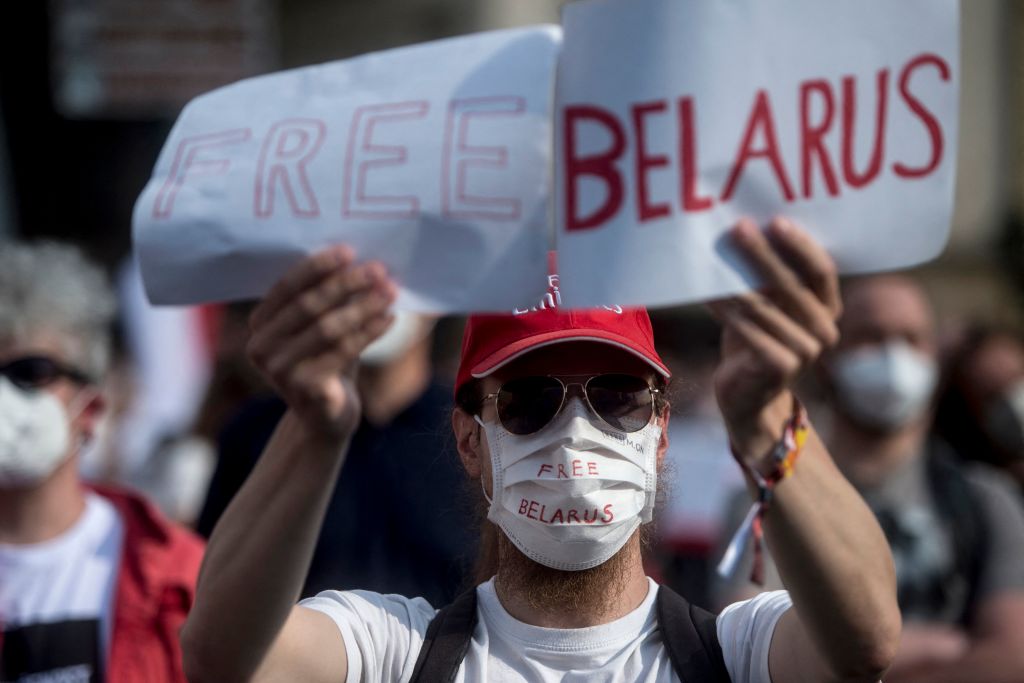Belarus’s opposition movement is gathering momentum. This week – just days after meeting president Biden – the country’s opposition leader Sviatlana Tsikhanouskaya was in London to visit Boris Johnson and Dominic Raab. But what does this mean for ordinary Belarusians living under the rule of Alyaksandr Lukashenka, the brutal dictator still in charge of the country? Do they finally have cause to be optimistic about the future?
As recently as April, Belarus’ democratic movement appeared to be running out of funding and impetus, with no clear strategy for ousting Lukashenka. Bolstered by a fearsome state security apparatus and Russian support, Lukashenka has unleashed a brutal crackdown on anyone who dares to challenge his 27-year reign.
Since last August’s falsified presidential elections sparked mass protests, the Belarusian KGB have arrested some 35,000 people. State television regularly broadcasts images of regime critics next to nooses. The apparent murder by hanging of Belarusian dissident Vital Shyshou in Kyiv earlier this week suggests these nooses are more than a rhetorical indulgence.
The horrors of Lukashenka’s repressive regime have been reverberating beyond Belarus’s borders for some time
The consequences – and horrors – of Lukashenka’s repressive regime have been reverberating beyond Belarus’s borders for some time. In May, the Belarusian state forced down a passenger jet in order to seize a dissident journalist flying between two EU states. For months, the Belarusian authorities have been conveying Iraqi migrants to the border with Lithuania, seemingly intent on inflaming internal EU tensions around migration.
Ironically, the opposition probably owes its recent change in prominence to these same deranged antics, which have shown that Lukashenka’s regime is a security problem for everyone – including the UK. During his meeting with Tsikhanouskaya, Boris Johnson assured the exiled Belarusian opposition leader of the UK’s support in characteristically robust terms. ‘We are very much on your side,’ the PM told Tsikhanouskaya. Yet to prove this, actions will speak more loudly than words.
So what can the UK do? Most pressingly, the government should start by strengthening its own security and expelling known KGB intelligence officers from UK soil, especially given the direct risk they pose to Belarusian dissidents here and, by extension, to other UK citizens and residents. The UK could also demonstrate support for its Belarusian diaspora by suspending the Mutual Legal Assistance agreement with the current authorities and working to block the regime from (ab)using Interpol.
Such actions should be part of efforts to make the UK a less welcoming place for Lukashenka and his cronies. This would involve adopting sectoral sanctions against Belarusian oil and potash exports and sanctioning Belarusian primary or secondary sovereign debt (currently traded at the London Stock Exchange). It would also mean expanding targeted sanctions against individuals who support and sustain Lukashenka’s regime.
As well as targeting the regime, Boris Johnson could take positive action through meaningful assistance to Belarusian civil society, from independent media to independent trade unions. The nature of the regime may mean that much of this support needs to take place outside of Belarus; for example, by offering funding and logistical support to students and academics expelled from Belarusian universities for political reasons, either by helping them to attend British universities or by contributing to an east European university in exile.
Of course, while useful, these measures do not constitute a strategy or solution to Lukashenka’s iron grip over Belarus. For now, none is obviously forthcoming.
The first step then must be to create the space in which a strategy can be formed, or a solution found, perhaps by establishing an international conference that could lead to a negotiation process for resolving the crisis.
For any chance of success, any conference or talks would need to involve representatives from the Belarusian regime and from the Russian government. Isolating and sanctioning the regime could contribute to bringing Lukashenka to the table but any high-level process or conference would also need a viable host. The UK is well-placed to play this role, free of the divisions that undermine EU foreign policy positions and significant enough to have some leverage.
What’s more, at a time when Whitehall is trying to implement the overly descriptive Integrated Review (IR), chairing a high-profile international conference or negotiations would help to realise some of the IR’s more nebulous statements around ‘defending values’ and the UK’s post-Brexit ‘leading international role’. British leadership here would also provide a neat contrast to the UK’s failure to participate in the Minsk peace agreements and Normandy Format for resolving the Ukraine Conflict. The UK’s absence there has been to the detriment of those processes. UK influence, too, has suffered.
There is no reason to expect that resolving the crisis in Belarus will be easy, or even possible. But it makes sense to try, especially as, at the very least, a UK-hosted conference would keep Belarus on the agenda. With the proper investment of time and energy, it could even be the start of a solution – a meaningful step to help the Belarusian opposition channel its momentum into a roadmap. Belarusians who have been living under the rule of Lukashenka for far too long deserve nothing less.






Comments